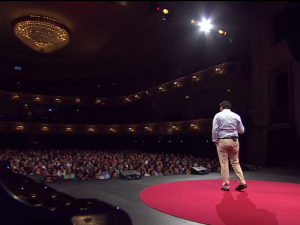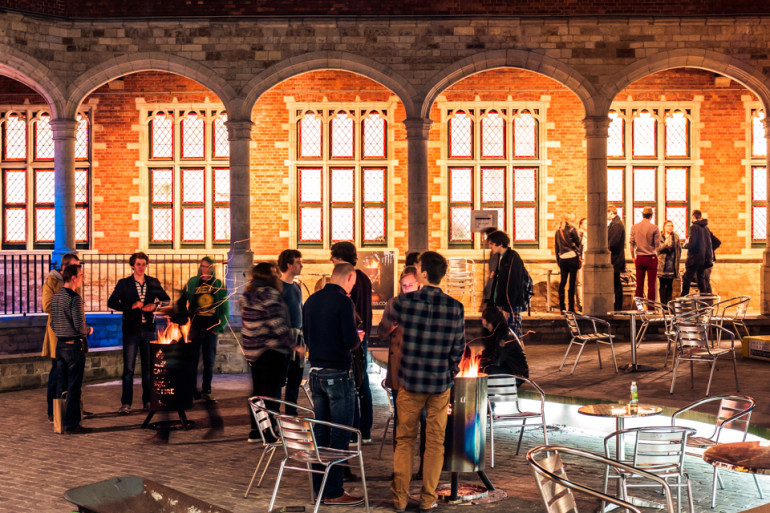
Is it that bad to be wrong sometimes?
When do you use ratio or emotion?
Is cooperating with others an act of selfishness?
What is the link between democracy and violence?
…enough food for thought at “Reasonable Doubt”, our latest event! We organized this event on March 12th in the beautiful Miry Concertzaal.
We kicked off our event a bit later than expected. No one here to blame though, given this was the first sunny day of the year and people are lustering for spring and a bit of sunshine. Luckily, our cosy interior made up for that.
 As soon as everybody got settled in the velvet red upholstered chairs, we were ready to listen to what Pieter Buteneers, our first speaker, had to say.
As soon as everybody got settled in the velvet red upholstered chairs, we were ready to listen to what Pieter Buteneers, our first speaker, had to say.
Not sure if ‘listening’ is really at its place here: Pieter and his assistant gave a very visual talk about artificial magic.
As the assistant is looking at a computer screen, his headset is doing the work for him. He looks at certain letters at the screen, the headset measures which brain parts light up by doing so and in this way, the headset is ‘reading’ the brain. After a few minutes, we get to read “TEDx is magic” on the screen. In the nearby future, systems like these will be used to read the brain for a variety of functions, for example to predict epileptic seizures or to help communicate people with the locked-in syndrome.
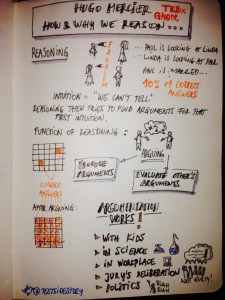 We switch to Hugo Mercier, researcher at the Cognitive Science Centre at the university of Neuchâtel.
We switch to Hugo Mercier, researcher at the Cognitive Science Centre at the university of Neuchâtel.
His central question is: Do we discuss with each other just to be right, or to actually reason with one another? Hugo states that we discuss to persuade others and to judge arguments. By listening what others have to say, we can evaluate our own thoughts and get to know if we or the other one is right, or we can try to persuade the other of his being wrong.
As you constantly interact with each other, you get more arguments, more thoughts and reflections, and therefore more sophisticated and tought-through results.
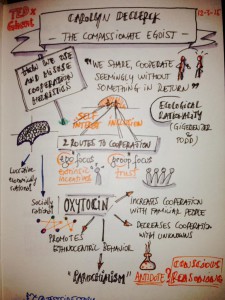 Our third speaker, Caroline Declerck, professor of Applied Economics at the university of Antwerp, explains us why working together with people is an act of selfishness in itself.
Our third speaker, Caroline Declerck, professor of Applied Economics at the university of Antwerp, explains us why working together with people is an act of selfishness in itself.
There are two factors taking the lead here: the ‘selfish bastard’ and the ‘pro self factor’.
While the pro social factor takes care of the feeling of togetherness, wanting to be part of a team; we only get to this stage if we primarily determine if this cooperation can be of any economic advantage to us.
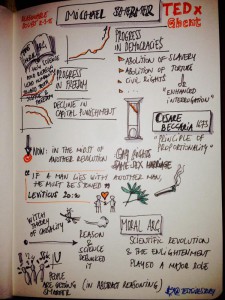 Michael Shermer, our last speaker, is the founder of the Skeptics Society and the editor-in-chief of Skeptic Magazine.
Michael Shermer, our last speaker, is the founder of the Skeptics Society and the editor-in-chief of Skeptic Magazine.
In his latest book, The Moral Arc, he explains how a scientific way of thinking manages to improve the world in various kinds of ways. He describes how science and reason lead humanity toward truth, justice and freedom.
“As democracy increases, violence decreases” is the theme of his talk.
He discusses the death penalty, women and gay rights and so much more. He states that within these delicate issues, rationality and abstract thinking are the keys to increased awareness and democracy.
Did you enjoy this event? Are you ready for some more? Join us at our PhD contest on March 26th!
Sketchnotes provided by @TestSideStory

